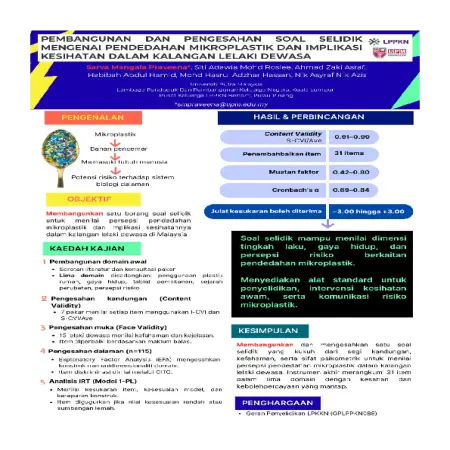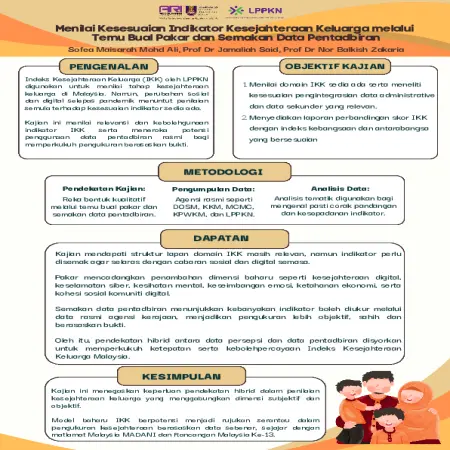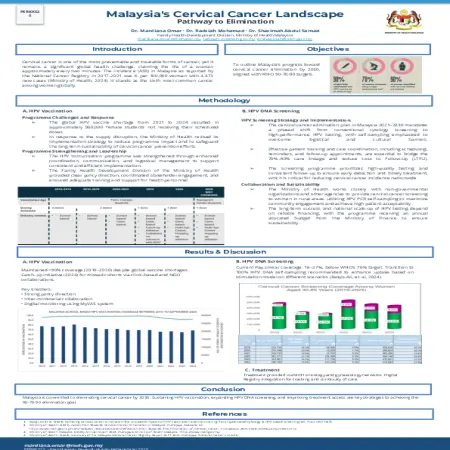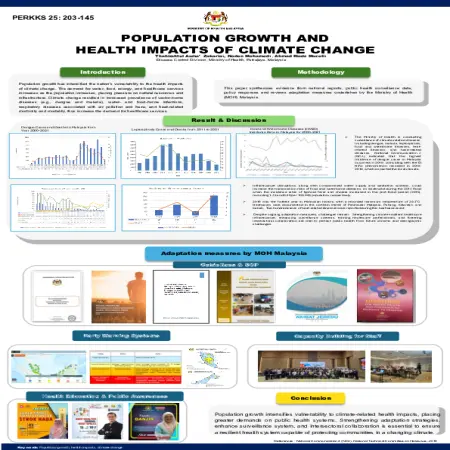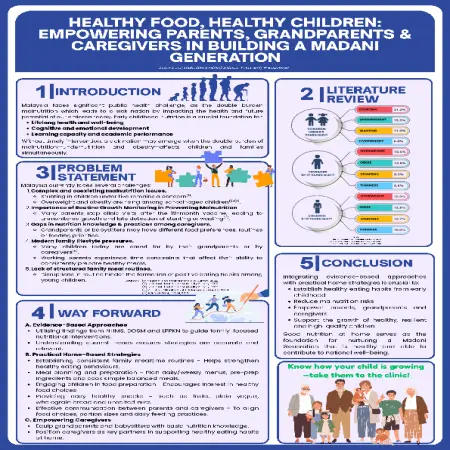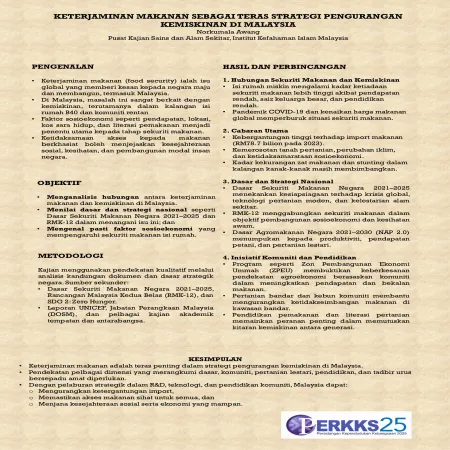Advanced Search
|
|
Pembangunan dan pengesahan soal selidik mengenai pendedahan mikroplastik dan implikasi kesihatan dalam kalangan lelaki dewasa
Item Type: Scientific Poster
Editor:
Year: 00/11/2025
Abstract: Microplastics are contaminants that enter the human body and pose risks to internal biological systems. The objective of this study was to develop a questionnaire to assess perceptions of microplastic exposure and its health implications among adult men in Malaysia. In conclusion, a questionnaire was developed and validated with strong content, comprehension, and psychometric properties to assess perceptions of microplastic exposure among adult men. The final instrument included 31 items in five domains with strong validity and reliability.
|
|
|
|
|
|
Menilai kesesuaian indikator kesejahteraan keluarga melalui temu bual pakar dan semakan data pentadbiran
Item Type: Scientific Poster
Editor:
Year: 00/11/2025
Abstract: The Family Well-being Index (FWI) by the NPFDB is used to assess the level of family well-being in Malaysia. However, social and digital changes after the pandemic require a reassessment of the suitability of existing indicators. This study assesses the relevance and usability of the FWI indicator and explores the potential of using official administrative data to strengthen evidence-based measurement.
|
|
|
|
|
|
Malaysia’s cervical cancer landscape pathway to elimination
Item Type: Scientific Poster
Editor:
Year: 00/11/2025
Abstract: Cervical cancer is one of the most preventable and treatable forms of cancer, yet it remains a significant global health challenge, claiming the life of a woman approximately every two minutes. The incidence (ASR) in Malaysia as reported by the National Cancer Registry in 2017-2021 was 6 per 100,000 women with 4,473 new cases (Ministry of Health). It stands as the sixth most common cancer among women globally. The objective of this study is to outline Malaysia’s progress toward cervical cancer elimination by 2030, aligned with WHO 90-70-90 targets. Conclusion, Malaysia is commited to eliminating cervical cancer by 2030. Sustaining HPV vaccination, expanding HPV DNA screening, and improving treatment access are key strategies to achieving the 90-70-90 elimination goal.
|
|
|
|
|
|
Population growth and health impacts of climate change
Item Type: Scientific Poster
Editor:
Year: 00/11/2025
Abstract: Population growth has intensified the nation’s vulnerability to the health impacts of climate change. The demand for water, food, energy, and healthcare services increases as the population increases, placing pressure on natural resources and infrastructure. Climate change resulted in increased prevalence of vector-borne diseases (e.g., dengue and malaria), water- and food-borne infections, respiratory diseases associated with air pollution and haze, and heat-related morbidity and mortality, thus increase the demand for healthcare services. Conclusion, population growth intensifies vulnerability to climate-related health impacts, placing greater demands on public health systems. Strengthening adaption strategies, enhance surveillance system, and intersectoral collaboration is essential to ensure a resilient health system capable of protecting communities in a changing climate.
|
|
|
|
|
|
Healthy food, healthy children: empowering parents, grandparents & caregivers in building a madani generation
Item Type: Scientific Poster
Editor:
Year: 00/11/2025
Abstract: Malaysia faces significant public health challenge, as the double burden malnutrition which leads to a sick nation by impacting the health and future potential of our children today. Early childhood nutrition is a crucial foundation for lifelong health and well-being; cognitive and emotional development; and learning capacity and academic performance. Without timely intervension, a sick nation may emerge when the double burden of malnutrition- undernutrition and obesity-affects children and families simultaneously. Conclusion, good nutrition at home serves as the foundation for nurturing a Madani Generation that is healthy and able to contribute to national well-being.
|
|
|
|
|
|
Keterjaminan makanan sebagai teras strategi pengurangan kemiskinan di Malaysia
Item Type: Scientific Poster
Editor:
Year: 00/11/2025
Abstract: Food security is a global issue that affects both developed and developing countries, including Malaysia. In Malaysia, this problem is closely linked to poverty, especially among B40 households and vulnerable communities. Socioeconomic factors such as income, location, cost of living, and nutritional literacy are key determinants of food security. Inequality in access to nutritious food can affect a country's social well-being, health, and human capital development. In conclusion, a multi-dimensional approach that encompasses policy, community, sustainable agriculture, education, and integrated governance is urgently needed. With strategic investments in R&D, technology, and community education, Malaysia can reduce import dependence; ensure access to healthy food for all; and generate sustainable social and economic well-being.
|
|
|
|
|
|
Podcast KASIH Lensa Keluarga - Generasi Sandwich: Realiti Keluarga Masa Kini?
Item Type: Video
Editor:
Year: 11/09/2025
Abstract: Modern families are increasingly caught in a complex balancing act — raising their own children while simultaneously caring for ageing parents. This episode of the KASIH Lensa Keluarga Podcast, titled "Generasi Sandwich: Realiti Keluarga Masa Kini?", explores the emotional, financial, and physical strain experienced by individuals caught between two caregiving roles. Featuring Rosmonaliza Abdul Ghani, Director of the Family Well-being Division at LPPKN, and hosted by Ally Iskandar, the discussion sheds light on the challenges and resilience of Malaysia’s “sandwich generation.” It highlights the urgent need for awareness, empathy, and systemic support to safeguard their well-being while they continue to uphold both ends of the family spectrum.
|
|
|
|
|
|
Podcast KASIH Lensa Keluarga: Generasi Muda: Kerja Dulu, Kahwin Kemudian?
Item Type: Video
Editor:
Year: 07/08/2025
Abstract: This episode of the KASIH Lensa Keluarga Podcast explores the question faced by many young adults today: Should one prioritise building a career before marriage, or marry first and establish a career later? Increasingly, younger generations are choosing to focus on career development before starting a family, but is this choice ideal for everyone? The discussion features Md Noh Saiman, Chief Assistant Director, Counselling and Intervention Unit, LPPKN, and Ryan Deedat, singer and social media influencer. Together, they will share insights from professional and youth perspectives on how career aspirations, relationships, and personal values influence decisions about marriage and life choices. The session aims to foster deeper reflection on balancing work, love, and long-term aspirations among Malaysia’s younger generation.
|
|
|
|
|
|
Podcast KASIH Lensa Keluarga: Kahwin Lewat: Pilihan atau Tekanan?
Item Type: Video
Editor:
Year: 22/08/2025
Abstract: Marriage is often seen as a milestone in life, yet many young adults today are choosing—or feeling compelled—to delay it. This episode of the KASIH Lensa Keluarga Podcast explores the timely question, Kahwin Lewat: Pilihan atau Tekanan? Is the decision shaped by career ambitions, emotional readiness, or the weight of societal expectations? Bringing together both professional expertise and lived experience, the conversation features Puan Noor Azlin Muhammad Sapri, Chief Assistant Director at LPPKN, and renowned singer, host, and celebrity Sissy Imann. Moderated by Ally Iskandar, the discussion offers thought-provoking insights into how personal aspirations, cultural norms, and social pressures intertwine in shaping decisions about love, commitment, and the future. The session aims to spark reflection among Malaysia’s younger generation on redefining marriage within the realities of modern life.
|
|
|
|
|
|
Maternal mental well-being: challenges and implications for the family institution
Item Type: Article
Editor:
Year: 00/06/2025
Abstract: Maternal mental well-being is a key determinant of overall family well-being. However, various modern challenges negatively impact mothers’ well-being and increase the risk of parental burnout. This study aims to examine the roles and involvement of mothers in family institutions, their perceptions of motherhood, the key challenges they face, and the current status of their mental health status. The study involved 3,988 Malaysian mothers aged 18 and above with children. Data were collected through an online survey in May 2024 using a convenience sampling method and analysed descriptively using Statistical Package for Social Sciences (SPSS) software. Findings indicate that mothers play a dominant role in doing housework (48.0%), managing children’s education (41.0%), ensuring daily needs are met (36.6%) and maintaining family health (34.8%). In terms of perception, most Malaysian mothers believe that being a mother today is more challenging than in the past. The primary challenges faced by mothers include the rising cost of living (80.0%), work-family imbalance (66.8%) and financial stress (58.9%). The study found that 32.2% of respondents reported experiencing depression due to these challenges, with 10.3% frequently feeling depressed. Additionally, only 16.6% of mothers felt that society truly understands the struggles they face. This study highlights the need for integrated interventions such as family-friendly policies, flexible work arrangements, and stronger social support to help mothers manage their mental well-being. These measures can alleviate maternal stress, contributing to family stability and overall societal well-being.
|
|
|
|





